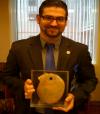Having Rapid Heart Beat Episodes. Part Of Kidney Removed Due To Cancer And Gall Bladder Removed. What Could This Be?

Thanks for sharing your health concerns.
You are suffering from paroxysmal atrial fibrillation, probably with episodes of what we call "rapid ventricular response", meaning that your heartbeat goes quite fast, as as 180-190's like you mentioned. The cause of atrial fibrillation is usually a mix of aging and enlargement of the upper chambers of the heart; if you have had an ultrasound of the heart before (if you haven't you should) your cardiologist could tell you if the upper chambers are enlarged.
Another very frequent association is that of sleep apnea (snoring and breathing-stopping episodes at night) and atrial fibrillation, you could discuss further with your cardiologist to see if he suspects this issue with you. There are medications that are used to control blood pressure but also can make your heart go slower, and in atrial fibrillation they can be used, such as metoprolol, diltiazem and verapamil; depending on your risk profile, there are also arrhythmics, medications that keep you away from having episodes (not only slow you down) but their efficacy is about 50%. Another important issue is that patients with atrial fibrillation have increased risk of stroke, so you should talk to your cardiologist to see if you should be on full dose aspirin daily or perhaps a blood thinner.
All in all, I do not think that your hiatal hernia or a nerve compression is triggering these episodes; they arise as short circuits in the upper chamber of the heart.
Hope this is useful, wish you the best health,,
Dr Brenes-Salazar MD
Cardiology
Mayo Clinic Rochester MN

It appears again by your description of inciting events that probably you are going in and out of paroxysmal atrial fibrillation with rapid response. It is paramount for you to keep that appointment with your cardiologist.
In terms of your other question on how fluid retention looks: Well exactly as you describe; we use the term pitting edema to describe swelling from fluid in interstitial space. The causes are many, including weak heart function. It tends however to be symmetric in that case. Other causes of leg swelling include kidney failure, liver failure and clots in the legs. So again, very important for you to mention these new changes to your cardiologist.
Hope this is useful information. Wish you the best health.
Dr Brenes Salazar md
Answered by

Get personalised answers from verified doctor in minutes across 80+ specialties



